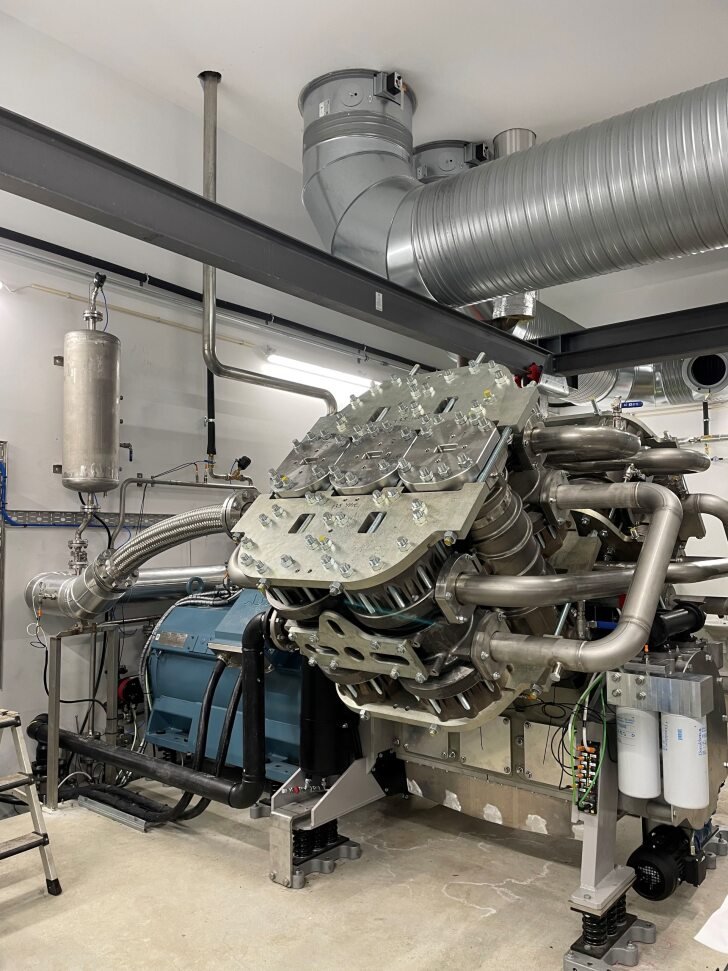HoegTemp produces steam at Pelagia fish plant
Enerin’s HoegTemp high-temperature heat pump installed at Pelagia, Måløy where it will be used to produce steam.
The 400-kilowatt first stage HoegTemp industrial heat pump at the Pelagia Måløy fish processing plant in Norway has been commissioned successfully. The heat pump is delivering steam in the fishmeal and fish oil processes at the Måløy site.
Unlike conventional heat pumps that rely on a phase change of the working medium—where a fixed relationship exists between temperature and pressure—ENERIN's technology can effortlessly handle temperature variations on both the hot and cold sides.
“At Pelagia, the HTHP utilizes various heat sources, including waste heat, in the range of 15-90°C, and delivers steam at temperatures of 130–180°C. The heat pump delivers steam at 5 barg pressure, handling fluctuating pressures between 2 to 8 barg (130–180°C).”
“It can also work with very high temperature lifts (i.e. the temperature difference between the hot and cold sides), providing energy savings of 50–70% for temperature lifts of 80–100°C (176–212°F).”
For steam applications, HoegTemp heats a steam generator that boils water to produce steam, essentially replacing traditional boilers with sustainable thermal energy with less greenhouse gas emissions. Preferably using renewable-generated electricity, the heat pump can recycle heat from a cooling circuit, a waste heat stream, or directly from the ambient air, using fan coils—thereby generating more thermal heat energy efficiency gains than the energy it consumes.
The simple integration of the heat pump required limited changes to the current equipment which reduced the technical risk and costs of the project. Enerin believes that CAPEX can be reduced by connecting a flexible heat pump to the main heating system, instead of integrating a specialized heat pump into the process which is costly. The flexibility to operate across a wide temperature range and utilising a heat pump to run on excess renewables offers easier and cheaper integration and better OPEX.
“For ENERIN the project is a unique showcase because the heat pump can follow both the varying source temperature and the varying steam pressure demands, demonstrating its robustness towards fluctuating conditions.
Due to this, the number of processing hours for the factory can be extended because the HoegTemp is able to deliver and collect energy at different temperature levels.”
Higher temperatures are required at Pelagia to turn the skin and bones from the fish into a “watery soup” where the water is evaporated off to a point where it can be dried and turned into a fine, dry powder for animal feed.
To optimise the operation of the HoegTemp HTHP, especially during the batch process at the plant when the trawlers come in with the catch, the heat pump can utilise seawater temporarily as a heat source.
“With seawater access, the Stirling heat pump can be in operation for an additional 5-6 hours before the waste heat becomes available for recycling.
In principle, this adjustment could extend the heat pump’s operational hours by approximately 400–500 hours per year, although we are investigating other ways in which wastewater at ambient temperature could be recycled.”
Currently, the Pelagia manufacturing plants use fossil-fired steam boilers that produce steam (175° Celsius), and to heat air in the dryers for the final stages of product drying (200–250°C).
Pelagia aims to achieve a lower energy input for each unit of produced product because the energy efficiency, or Co-efficient of Performance, of the heat pumps is significantly higher than for fossil-fired steam boilers. The company wants to decrease its greenhouse gas emissions at the factory and reduce the amount of carbon dioxide quotas it needs to buy to offset current emissions.
Read the about the commissioning of our heat pump by Christina Hayes: Enerin Delivers 400kW Helium Heat Pump to Norwegian Fish Oil Producer published on the Natural Refrigerants News and Marketplace.
The article documents the HoegTemp’s advantages:
Single-step heating up to 250°C, even from −30°C (−22°F) sources.
Energy savings of 50–70% for temperature lifts of 80–100°C (176–212°F).
No loss of heating capacity in cold conditions.
Faster and more efficient defrosting using separate glycol loops and steam heat.
Read about Enerin’s HoegTemp installation at Pelagia in the Forbes story by WeDon’tHaveTime journalist – Nick Nuttall.
The project was funded by ENOVA. Pelagia is one of the two use cases on the Horizon Europe/CINEA project SUSHEAT. The Pelagia Måløy site where the Enerin heat pump is installed, below (Photo: Pelagia).
Optimally utilising raw materials is part of Pelagia’s sustainability goals where 100 per cent of the fish is used. Pelagia Food processes solely wild-caught fish.




